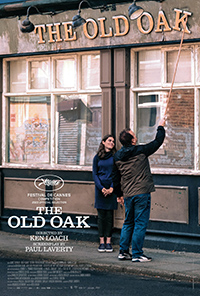A Tree Grows in England: Loach Loses Steam in Klutzy Refugee Drama
 There’s no doubt Ken Loach is one of the most prominent social-realist directors of his time, navigating the plight of poverty (most often) amongst Britain’s working class across a variety of eras, situations, and themes. For six decades, he’s delivered quiet, unassuming dramas which are often bolstered by moving performances, many from first time actors who are unforgettable (like Crissy Rock in 1994’s Ladybird Ladybird). His latest offering, one of several titles in a vibrant late period in his career, The Old Oak, unfortunately is on the iffy side, detailing a xenophobic neighborhood in Northern England upon the arrival of Syrian refugees. Reuniting once again with scribe Paul Laverty, who’s been scripting Loach’s films since 1996, their latest heartily wears its maudlin manipulation on its shirt sleeve, rather predictably checking off all the boxes of logistical miserabilisms before the storm breaks through a rather trite depiction of reconciliation.
There’s no doubt Ken Loach is one of the most prominent social-realist directors of his time, navigating the plight of poverty (most often) amongst Britain’s working class across a variety of eras, situations, and themes. For six decades, he’s delivered quiet, unassuming dramas which are often bolstered by moving performances, many from first time actors who are unforgettable (like Crissy Rock in 1994’s Ladybird Ladybird). His latest offering, one of several titles in a vibrant late period in his career, The Old Oak, unfortunately is on the iffy side, detailing a xenophobic neighborhood in Northern England upon the arrival of Syrian refugees. Reuniting once again with scribe Paul Laverty, who’s been scripting Loach’s films since 1996, their latest heartily wears its maudlin manipulation on its shirt sleeve, rather predictably checking off all the boxes of logistical miserabilisms before the storm breaks through a rather trite depiction of reconciliation.
In 2016, a dwindling local neighborhood suddenly discovers they’ll have new community members when a bus load of Syrian refugees arrives. The caravan consists of women and children who’ve just escaped their hellacious war zone and they’re met with outright hostility by several members of the white natives. Before they can even step off the bus, an altercation between Yara (Elba Mari) and some crude knuckle head finds her camera broken, an object with significant meaning attached to, as we’ll come to find. Tommy Joe Ballantyne (Dave Turner), the owner of the local bar, a mainstay called The Old Oak, is immediately helpful, offering to help Yara fix her camera while driving the helpful Tania (Debbie Honeywood) around to drop off supplies for the families. As a friendship blossoms between Yara and Tommy Joe, his old crew of customers spew vitriolic hatred for their new neighbors. When Tommy Joe is approached to open a closed off portion of his edifice to build a community center and bring everyone together, just like the neighborhood did during mass strikes in his father’s generation, he initially declines. Soon he realizes if he doesn’t do it, nothing will improve. An outright success, especially for providing food services to the local children, Tommy Joe and Yara’s plans are soon thwarted by the hate mongers among them.
As per usual, Loach fashions the film atop the shoulders of a savior, Dave Turner, returning for duty after appearances in I, Daniel Blake (2016) and Sorry We Missed You (2019). It’s a highly empathetic performance and he’s mostly up to the tasking, though several moments of histrionics mix uneasily with his poorly attenuated revelation of suicidal ideations to explain the origin story of his lovable little dog, Merra. The dog, like Yara’s broken camera in the opening sequence, represents how both characters are also united through the sacrifice of their defense mechanisms, which also forces them to move beyond respective traumas for what the film suggests is a brighter feature. Oh, that would it were so simple. Their piousness is, of course, matched with equal rigor by their tormentors. The band of old white racist cronies who have kept Tommy Joe’s struggling bar open are egregiously awful, which they’re supposed to be, but there’s an air of theatricality which makes them seem more appropriate as raggedy old witch hunters in a production of The Crucible.
Ebla Mari as Yara is warm and enjoyable, but there’s a saintliness to her character which becomes taxing, the death of a family member employed for the emotionally exploitative denouement. The same can be said for Debbie Honeywood, also of Sorry We Missed You, popping up with little to no interiority as a neighborhood angel. Robbie Ryan also returns as Loach’s preferred cinematographer for a rather low-key production taking place mostly, of course, in the titular bar. Unfortunately, The Old Oak is evidence of Loach’s ungainliness when straying out of his tight little comfort zone. Laverty handles the Syrian refugee crisis as awkwardly as he did with his first script for Loach, the 1987 set Carla’s Song (1996), wherein a bus driver falls in love with a Nicaraguan woman, forcing them to head back to the crisis in her country to find her missing husband.
The Old Oak is Loach doing what he always does, which is showcasing how kindness is the only way we’re going to survive as a species, and his latest isn’t without incredibly touching moments which are geared towards working your tear ducts over. But it’s also an incredibly obvious film, calibrated to manipulate at the most basic level, arguably because Loach earnestly wishes to get his well meaning intention across instead of focusing on quality storytelling. He’s using a jackhammer to open a window when it just needs a little lubrication to oil the hinges.
Reviewed on May 26th at the 2023 Cannes Film Festival – Competition. 113 Min.
★★/☆☆☆☆☆


